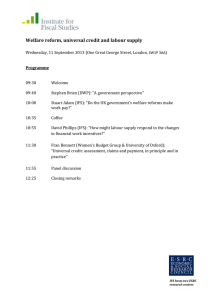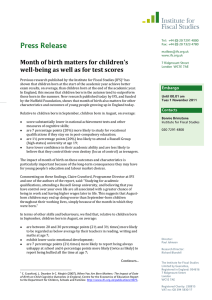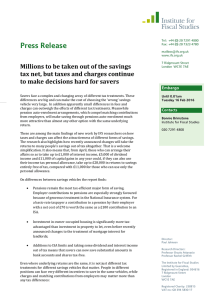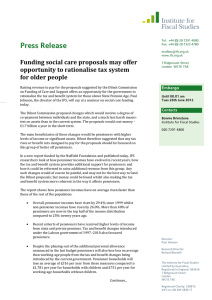IFS Press Release Cuts to council tax support increase
advertisement
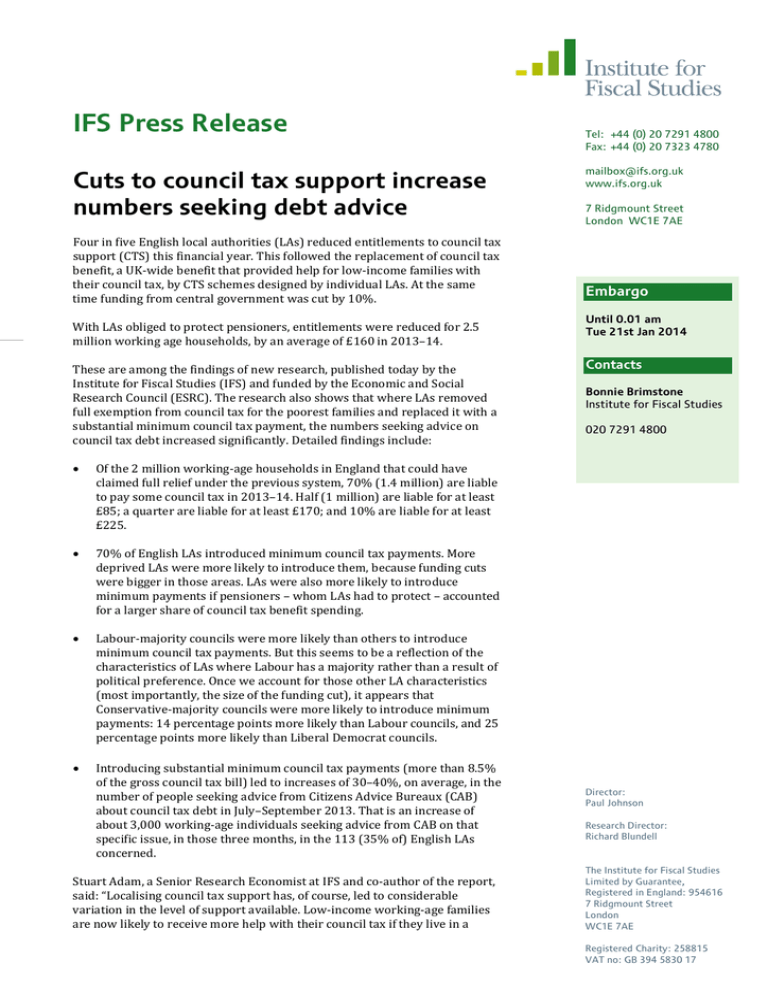
IFS Press Release Cuts to council tax support increase numbers seeking debt advice Four in five English local authorities (LAs) reduced entitlements to council tax support (CTS) this financial year. This followed the replacement of council tax benefit, a UK-wide benefit that provided help for low-income families with their council tax, by CTS schemes designed by individual LAs. At the same time funding from central government was cut by 10%. With LAs obliged to protect pensioners, entitlements were reduced for 2.5 million working age households, by an average of £160 in 2013–14. These are among the findings of new research, published today by the Institute for Fiscal Studies (IFS) and funded by the Economic and Social Research Council (ESRC). The research also shows that where LAs removed full exemption from council tax for the poorest families and replaced it with a substantial minimum council tax payment, the numbers seeking advice on council tax debt increased significantly. Detailed findings include: • • • • Tel: +44 (0) 20 7291 4800 Fax: +44 (0) 20 7323 4780 mailbox@ifs.org.uk www.ifs.org.uk 7 Ridgmount Street London WC1E 7AE Embargo Until 0.01 am Tue 21st Jan 2014 Contacts Bonnie Brimstone Institute for Fiscal Studies 020 7291 4800 Of the 2 million working-age households in England that could have claimed full relief under the previous system, 70% (1.4 million) are liable to pay some council tax in 2013–14. Half (1 million) are liable for at least £85; a quarter are liable for at least £170; and 10% are liable for at least £225. 70% of English LAs introduced minimum council tax payments. More deprived LAs were more likely to introduce them, because funding cuts were bigger in those areas. LAs were also more likely to introduce minimum payments if pensioners – whom LAs had to protect – accounted for a larger share of council tax benefit spending. Labour-majority councils were more likely than others to introduce minimum council tax payments. But this seems to be a reflection of the characteristics of LAs where Labour has a majority rather than a result of political preference. Once we account for those other LA characteristics (most importantly, the size of the funding cut), it appears that Conservative-majority councils were more likely to introduce minimum payments: 14 percentage points more likely than Labour councils, and 25 percentage points more likely than Liberal Democrat councils. Introducing substantial minimum council tax payments (more than 8.5% of the gross council tax bill) led to increases of 30–40%, on average, in the number of people seeking advice from Citizens Advice Bureaux (CAB) about council tax debt in July–September 2013. That is an increase of about 3,000 working-age individuals seeking advice from CAB on that specific issue, in those three months, in the 113 (35% of) English LAs concerned. Stuart Adam, a Senior Research Economist at IFS and co-author of the report, said: “Localising council tax support has, of course, led to considerable variation in the level of support available. Low-income working-age families are now likely to receive more help with their council tax if they live in a Director: Paul Johnson Research Director: Richard Blundell The Institute for Fiscal Studies Limited by Guarantee, Registered in England: 954616 7 Ridgmount Street London WC1E 7AE Registered Charity: 258815 VAT no: GB 394 5830 17 better-off area without too many low-income pensioners among their neighbours. Conversely working-age people living in poorer areas and in areas containing more low-income pensioners receive less help.” Robert Joyce, a Senior Research Economist at IFS and co-author of the report, added: “Introducing minimum payments has increased the number of people seeking advice about council tax debt. It remains to be seen how successfully the local authorities concerned manage to collect the council tax that they have asked for.” ENDS Notes to Editors: 1. For embargoed copies of the report or other queries, please contact: Bonnie Brimstone bonnie_b@ifs.org.uk 020 7291 4818. 2. The authors gratefully acknowledge funding from the Economic and Social Research Council (ESRC) through the Centre for the Microeconomic Analysis of Public Policy at the IFS. 3. The authors thank Citizens Advice for providing data, analysed in this IFS Report, on the number of people seeking advice on different topics in each local authority. For more information or comment from Citizens Advice please contact Emma Brennan Emma.Brennan@citizensadvice.org.uk 020 7833 7178 IFS hosts two ESRC Research Centres. The Institute for Fiscal Studies Limited by Guarantee, Registered in England: 954616 7 Ridgmount Street London WC1E 7AE
